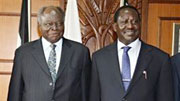
The stakes for Kenya’s March 4 general elections are high. The country’s future political and economic stability will be determined by the extent to which the polls are peaceful and credible. Experts warn that a repeat of the widespread violence and destruction that followed the disputed 2007 elections cannot be ruled out, even though the country is better prepared to respond.
Kenya is not as robust as many perceive it to be. During the past six months, urban criminal violence has increased; deadly acts of terrorism, linked mainly to the Somalia-based al-Shabaab group, have increased significantly; and tribal clashes sparked by cattle rustling and resource disputes have resulted in scores of fatalities. This has increased pre-election tensions and stretched the capacity of the police. International concern has led to calls by the US and Britain for integrity, transparency, and legitimacy in the polls.
As far as the economy is concerned, a World Bank report has identified the need for peaceful polls as a key determinant for economic recovery. Economic growth has not yet recovered from the slump following the 2007 elections. It dropped from 7.1 percent in 2007 to 1.5 percent in 2008, and is expected to reach 4.3 percent for 2012. Subject to a positive outcome of the March elections, 2013 could produce a growth rate of 5 percent.
Many of the root causes of the 2007 violence have not changed or have only been partially addressed. High unemployment among the youth, lack of land reforms, and slow and ineffective police reforms are some examples. But concern centers mainly on two factors:
• Continued ethnic mobilization
• Two top candidates have been indicted by the International Criminal Court and could be elected to leadership positions
Tensions resulting from ethnic mobilization continue to be potentially the most explosive factor. Tribe remains central to the perception of politics by Kenyans, even though it has become politically incorrect to openly mobilize on that basis. It is therefore ironic that, while the rhetoric from party leaders has become uniformly critical of ethnic politics, in practice the same party leaders queue up to solicit the blessings and support from tribal “councils of elders.”
Kenya’s five largest tribal groups—the Kikuyu, Kalenjin, Luo, Luhya, and Kamba—have each entered into an alliance with one of the five leading political parties. The result is that “issue-based politics” or legislative programs—which normally are aimed at addressing the needs of specific voting sectors such as women, farmers, workers, or the business community—have taken a back seat to ethnicized identity politics. Tribal identity continues to be the basis for political competition, with tribal groups expecting their candidates to provide political and government positions after the elections.
Reputable survey results published in early January suggest that the electoral coalition led by presidential candidate (and current Prime Minister) Raila Odinga was likely to win the election with 51 percent of voter support. In second place, according to the survey, was the coalition led by presidential hopeful Uhuru Kenyatta with 39 percent support. Kenyatta—a Kikuyu who banks on Kikuyu support—as well as his coalition partner William Ruto—a Kalenjin who expects his tribe to support him—have been indicted by the International Criminal Court on charges implicating them in organizing and coordinating the 2007 election violence. This has introduced an additional source of uncertainty and potential instability.
International repercussions cannot be ignored. Britain, for example, has made it clear that Kenya risks isolation if suspects of serious crimes are elected into top positions. The irony is that in 2007, these two leaders were on opposing sides, with Uhuru Kenyatta being linked with violence against members of the Kalenjin tribe while William Ruto allegedly mobilized the Kalenjin to attack members of the Kikuyu tribe. Their electoral coalition now sets the goal of “national unity, reconciliation and prosperity for all Kenyans.”
While the threat of electoral violence remains, there can be no doubt that Kenyans are better prepared than in 2007, and more aware of possible serious consequences. If ethnic violence does occur, it is likely to be better contained and not as widespread and extensive as in 2007.
Peter Gastrow is a Senior Adviser at the International Peace Institute.
About the photo: Kenyan President Mwai Kibaki (left) and presidential candidate Raila Odinga in an undated photo. Credit: VOA




